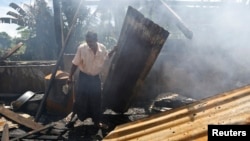THANDWE, BURMA —
Fresh sectarian violence broke out this week between Buddhists and Muslims in Burma, reviving concerns that the country is not doing enough to alleviate tensions that the country’s president say are harming its national image. Like many past outbreaks, this week’s violence was located in Rakhine state. At least six Muslims were killed.
Witnesses say sectarian fighting overwhelmed the village of Hta Pyu Chai when a Buddhist mob torched most of the Muslim neighborhoods.
When Tun Tun Naing, 17, came out of hiding he discovered his father’s dead body lying in the mud near the burning embers of the village mosque.
His father, Khin Naing, had been hacked to death with a machete by the same Buddhist mob that came through town torching Muslim homes the day before.
Tun Tun said his father was not very good at running, and when the mob came through town he could not save himself.
The village is just a few kilometers away from what is considered Burma’s most popular tourist beach destination near the town of Thandwe.
There, days before, witnesses say an ethnic Kaman Muslim politician named Kyaw Zan Hla was involved in an argument over an inconveniently parked motorbike.
He was later arrested for insulting Buddhism. Buddhist mobs then gathered, armed themselves with slingshots, machetes, and other homemade weapons, and went to nearby Muslim villages and started burning homes.
Witnesses said they did not recognize the people in the mob who went on to burn dozens of homes in three villages.
The violence has gone unnoticed by tourists staying at the nearby beach resorts. A hotel manager said half of his guests do not even know about the fighting.
President Thein Sein was making his first visit to Rakhine state at the time of the violence. He visited Sittwe, Maungdaw, and Kyaukpyu, where similar incidents have taken place. He arrived in Thandwe on October 2 as homes in nearby villages continued to burn.
The U.S. embassy in Rangoon released a statement condemning the violence.
Similar incidents of communal violence have been occurring since June 2012, usually pitting Buddhists against their Muslim neighbors.
Maung Myint Htay is a Rakhine Buddhist from Hta Pyu Chai village who witnessed the violence. He said he does not know where the mob came from and that the view that the Muslims are not welcome and should be pushed out of the country is held by many.
“I don’t think what happened was not right. The people who came to burn homes, it’s their historical duty to do that,” said Maung Myint.
Myint Aung is one of Maung Myint’s neighbors. He said the rioters came at 3:30 a.m. and threw fire bombs at people's houses without knowing whether they were Muslims or Buddhists.
Six Buddhists were arrested Wednesday in connection to the riots in the village. One of them is a member of the Rakhine Nationalities Development Party, a predominantly Buddhist group.
Witnesses say sectarian fighting overwhelmed the village of Hta Pyu Chai when a Buddhist mob torched most of the Muslim neighborhoods.
When Tun Tun Naing, 17, came out of hiding he discovered his father’s dead body lying in the mud near the burning embers of the village mosque.
His father, Khin Naing, had been hacked to death with a machete by the same Buddhist mob that came through town torching Muslim homes the day before.
Tun Tun said his father was not very good at running, and when the mob came through town he could not save himself.
The village is just a few kilometers away from what is considered Burma’s most popular tourist beach destination near the town of Thandwe.
There, days before, witnesses say an ethnic Kaman Muslim politician named Kyaw Zan Hla was involved in an argument over an inconveniently parked motorbike.
He was later arrested for insulting Buddhism. Buddhist mobs then gathered, armed themselves with slingshots, machetes, and other homemade weapons, and went to nearby Muslim villages and started burning homes.
Witnesses said they did not recognize the people in the mob who went on to burn dozens of homes in three villages.
The violence has gone unnoticed by tourists staying at the nearby beach resorts. A hotel manager said half of his guests do not even know about the fighting.
President Thein Sein was making his first visit to Rakhine state at the time of the violence. He visited Sittwe, Maungdaw, and Kyaukpyu, where similar incidents have taken place. He arrived in Thandwe on October 2 as homes in nearby villages continued to burn.
The U.S. embassy in Rangoon released a statement condemning the violence.
Similar incidents of communal violence have been occurring since June 2012, usually pitting Buddhists against their Muslim neighbors.
Maung Myint Htay is a Rakhine Buddhist from Hta Pyu Chai village who witnessed the violence. He said he does not know where the mob came from and that the view that the Muslims are not welcome and should be pushed out of the country is held by many.
“I don’t think what happened was not right. The people who came to burn homes, it’s their historical duty to do that,” said Maung Myint.
Myint Aung is one of Maung Myint’s neighbors. He said the rioters came at 3:30 a.m. and threw fire bombs at people's houses without knowing whether they were Muslims or Buddhists.
Six Buddhists were arrested Wednesday in connection to the riots in the village. One of them is a member of the Rakhine Nationalities Development Party, a predominantly Buddhist group.





